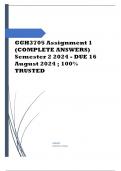ADMIN
[COMPANY NAME]
,Section A Section A of this assignment focuses on referencing.
Many of you struggle with referencing in your written
assignments and often obtain a mark of less than 50%, even
though you would have passed if you had referenced correctly.
The purpose of this section is to help you acquire the skill of
referencing. You will then be in a better position to reference
correctly in your written assignments and portfolio. 1. Explain the
importance of referencing both in-text and at the end of an
assignment. (3) 2. Correctly reference the following sources: (5)
2.1. Title: Environmental Management in South Africa Authors: H
A Strydom, N D King, and F P Retief Year published: 2018
Edition: Third edition Publisher: Juta and Company Ltd City:
Pretoria ISBN: 9781485126102 2.2. Title: Importance of Insects
in Environmental Impact Assessment Authors: David M
Rosenberg, H. V Danks & Dennis M Lehmkuhl Year published:
1986 Volume: 10 Journal: 6 Page numbers: Environmental
Management URL: 773 – 783 Date accessed: 6 July 2018 2.3.
Title: Having an impact? The influence of nontechnical factors on
the effectiveness of SEA in transport decision making. Authors: T
B Fischer Year published: 2004 URL: Date accessed: 23 July
2016 GGH3705/001/2/2024 7 2.4. Title: Environmental
information systems a challenge to meet corporate environmental
strategy in the South African mining industry Author: Rogan
Morrison Year published: 2009 Thesis/ dissertation/ research
report Thesis Degree: MSc University: University of
Johannesburg 2.5. Title: Green Paper on the National
Environmental Management of the Ocean for General Comment
Country: Republic of South Africa The Government Gazette Year
published: 2012 Volume: 568 Issue: 35783 Notice number: 828
, Date: 30 October Page numbers: 3 – 84 3. Using the references
provided in Question 2, compile a reference list by applying the
“Rules for compiling a references list” as set out in the referencing
guidelines. (2) 4. Give the in-text reference (citation) of the
following sources: (5) 4.1. Weaver, A., Pope, J., Morrison-
Saunders, A., Lochner, P., 2008. Contributing to sustainability as
an environmental impact assessment practitioner. Impact Assess
Project Apprais., 26 (2), 91–98. 4.2. Hardin, G., 1968. The tragedy
of the commons, Science, New Series, 162 (3859), 1243–1248.
4.3. United Nations Development Programme (UNDP), 2002.
Human Development Report 2002. Oxford University Press, New
York. Available via: 4.4. Feitelson, E., and Chenoweth, J., 2002.
Water poverty: Towards a meaningful indicator. Water Policy, 4,
263–281. 4.5. Bentley, M.J., Cofaigh, C.Ó., Anderson, J.B.,
Conway, H., Davies, B., Graham, A.G.C., Hillenbrand, C.-D.,
Hodgson, D.A., Jamieson, S.S.R., Larter, R.D., Mackintosh, A.,
Smith, J.A., Verleyen, E., Ackert, R.P., Bart, P.J., Berg, S.,
Drunstein, D., Canals, M., Colhoun, E.A., Crosta, X., Dickens,
W.A., Domack, E., Dowdeswell, J.A., Dunbar, R., Ehrmann, W.,
Evans, J., Favier, V., Fink, D., Fogwill, C.J., Glasser, N.F., Gohl.,
K., Golledge, N.R., Goodwin, I., Gore, D.B., Greenwood, S.L.,
Hall, B.L., Hall, K., Hedding, D.W., Hein, A.S., Hocking, E.P.,
Jakobsson, M., Johnson, J.S., Jomelli, V., Jones, R.S., Klages,
J.P., Kristoffersen, Y., Kuhn, G., Leventer, A., Licht, K., Lilly, K.,
Lindow., J., Livingstone, S.J., Massé, McGlone, M.S., McKay,
R.M., Melles, M., Miura, H., Mulvaney, R., Nel, W., Nitsche,
F.O., O’Brein, P.E., Post, A.L., Roberts, S.J., Saunders, K.M.,
Selkirk, P.M., Simms, A.R., Spiegel, C., Stolldorf, T.D., Sugden,
D.E., van de Putten, N., van Ommen, T., Verfaillie, D.,





